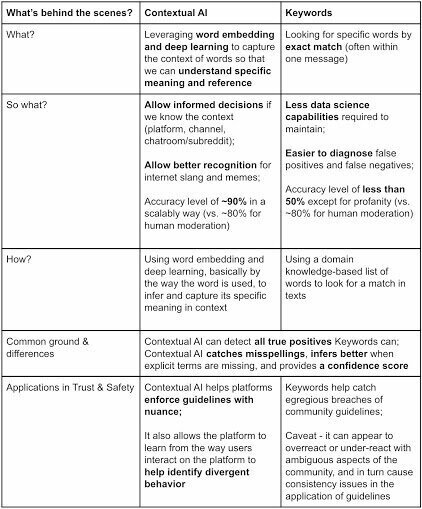Contextual AI vs. Keywords, Intelligence for Trust and Safety
Authors: Tiffany Xingyu Wang and Jonathan Purnell
AI is as good as the data gets, and it is as critical as the problem it's solving.
Most solutions for content moderation on platforms today are based on Keywords -- looking for specific words by exact match within a single message.
Yet, if you’re on a dating app where messages are typically personal and intimate, how would you determine a message is a flirting text versus a sexual assault? Or, on a freelancing marketplace, how would you take the right action on platform circumvention between genuine contracts with repeated transactions versus true bad actors trying to go offline to avoid platform fees? You need the context.
People often say AI is as good as the data gets; I would add -- AI is also as critical as the problem it's solving. Using the legacy engine to solve a community-critical problem like content moderation has far-reaching impact in more cases than you can imagine, and a false positive can be life-threatening.
Using a model that is trained with integrity can, on the contrary, increase the top-line of a business through brand safety and community retention. For this aforementioned motif, the following tableview dives deeper into the comparisons between Contextual AI and Keywords-based approaches.
It is obvious Contextual AI is the way to go. But why it is not a prevailing solution yet? The answer is that “it is hard and costly.”
The more ambiguity and the more corner cases there are, the more data you need to correctly navigate those complexities. Like skiing -- if it were a straight shot down the hill, you’d only need one gate (Keyword match); if the path is twisting and curvy, you need more gates to direct the skier down the hill. Gates are the data we need here (by vertical, platform, use case and etc), and the path toward the destination -- your community guideline -- is the AI model, Contextual AI.
The problem at hand, Trust & Safety of the internet, is a hard problem. We welcome all the partners to solve it altogether.
As Kennedy well put, “do the right thing, not the easy thing.”


